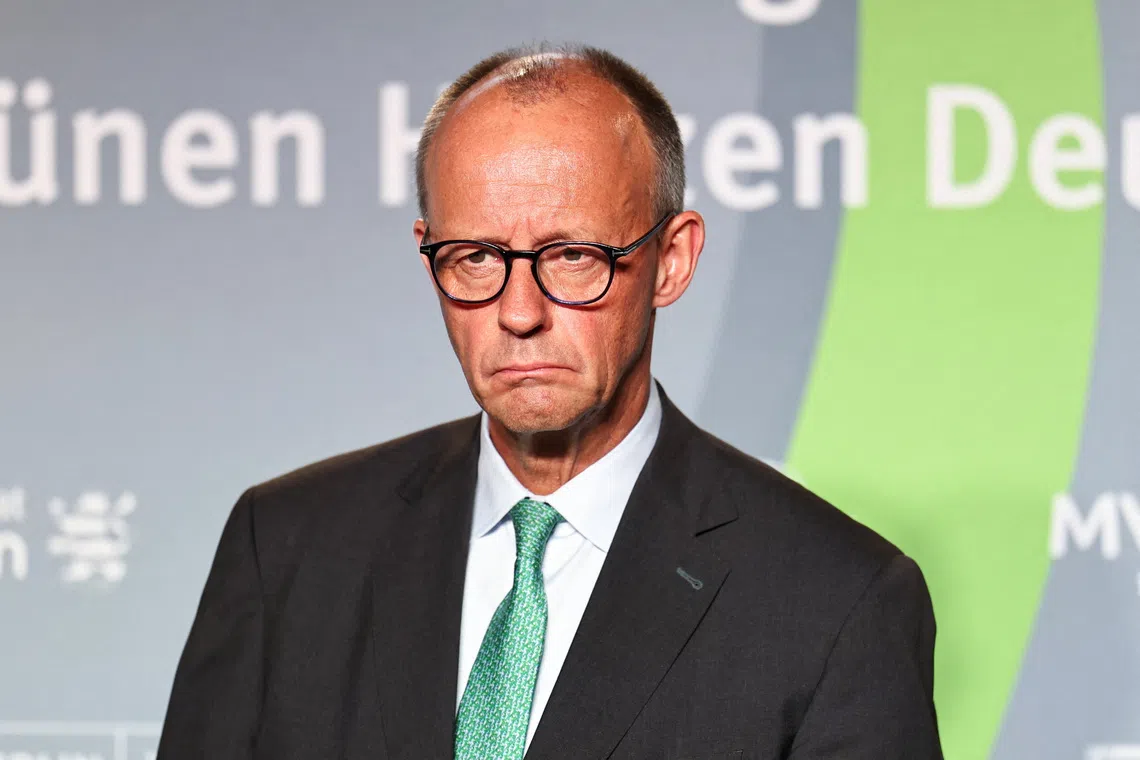German Chancellor Merz leans into far-right messaging to counter AfD
Sign up now: Get ST's newsletters delivered to your inbox

German Chancellor Friedrich Merz's comments were denounced as racist and discriminatory, with about 1,000 people protesting on Oct 19 in Berlin.
PHOTO: REUTERS
Follow topic:
BERLIN – German Chancellor Friedrich Merz doubled down on controversial remarks made last week that suggested the country has too many migrants, as the conservative politician seeks to regain the initiative over the far right.
“I have nothing to take back,” he said on Oct 20 when asked about comments he made about how cities in Germany look and why the government needs to step up deportations.
The opposition Green Party as well as members of his Social Democratic Party (SPD) coalition partner denounced the remarks as racist and discriminatory.
On Oct 19, around 1,000 people demonstrated against Mr Merz in front of the Brandenburg Gate in Berlin.
While the leader of the Christian Democratic Union (CDU) did not clarify what he meant last week by using the term “Stadtbild” or cityscape, he went further after a CDU leadership meeting, saying there were growing concerns about how migration was affecting safety, especially for women.
“Just ask your daughters, if you have any, what I might have meant,” he told reporters in Berlin. “Everyone will confirm that there’s a problem, especially after dark.”
Mr Merz, who once vowed to halve support for the far right, has been under intense pressure to respond to gains by the anti-immigrant Alternative for Germany, or AfD, which is first in some voter polls.
The conservative bloc’s stance towards cooperation with the far-right party was a key topic of the meeting, especially as state elections loom.
Two eastern states – Mecklenburg-Western Pomerania and Saxony-Anhalt – will head to the polls next September to elect local governments.
The AfD is the clear leader in both former communist regions and sidestepping the party to form governing coalitions could be difficult.
While Mr Merz has had success on the global stage, his domestic agenda has been bogged down by bickering and division within his ruling coalition.
Also, many Germans are anxious as the economy continues to struggle to grow and large companies cut jobs.
After discussions from some CDU officials calling for a more open approach towards working with the AfD, Mr Merz attempted to draw a clear line by reaffirming his position that there would be no cooperation with the far-right party after state elections.
“I want to believe Friedrich Merz,” Mr Tim Klussendorf, the SPD’s general secretary, said at a separate press conference.
“But we will judge him by whether he unambiguously enforces his position within the ranks of the CDU as party chairman, because words must be followed by deeds.”
Mr Merz used dramatic language to underscore his position to shun the AfD, which is classified as right-wing extremist by Germany’s domestic intelligence service.
“The AfD wants to destroy the CDU,” he said, vowing to close the gap to the party on the state level. “We will not let ourselves be destroyed by these people.” BLOOMBERG

